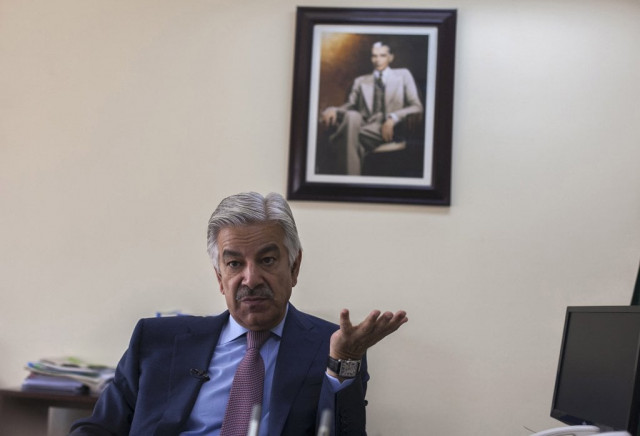Heart of Asia declaration ‘was harsher than BRICS’
Water minister slams Ayub regime for signing Indus treaty with India

Foreign Minister Khawaja Asif. PHOTO: REUTERS/FILE
These names had already come up as a part of the Heart of Asia declaration, which Pakistan is also a signatory to.
Foreign Minister Khawaja Asif indirectly admitted this in the policy statement he delivered before the Senate on Tuesday, while briefing them on the Summit of five emerging economies - Brazil, Russia, India, China and South Africa (BRICS) held in Xiamen, China in September.
Pakistan offered US joint operation against Haqqanis: Khawaja Asif
“The Heart of Asia declaration came before the BRICS declaration. It was even harsher than BRICS”, he remarked. He said it is the government’s official policy to declare the organisations that the Security Council declares as terrorist groups.
The groups that have been named in BRICS for violence in the region, besides the Haqqani network, include Lashkar-e-Taiba, Jaish-e-Mohammad, TTP and Hizb-ut-Tahrir.
“We, in this regard, express concern on the security situation in the region and violence caused by the Taliban, ISIS/Daish, Al-Qaida and its affiliates including Eastern Turkistan Islamic Movement, Islamic Movement of Uzbekistan, the Haqqani Network, Lashkar-e-Taiba, Jaish-e-Mohammad, TTP and Hizb-ut-Tahrir” read clause 48 of the BRICS declaration.
The inclusion of the two organisations in the final BRICS declaration has caught many in Pakistan by surprise and has also raised the question of why China did not try to omit this clause. However, diplomatic sources said the Chinese side played its role in diluting the wording of the clause.
Asif assured the Senate that Pakistan was not being isolated. He added that diplomatic support has increased recently, especially after United States President Donald Trump’s speech, highlighting the new US policy on Afghanistan while criticising Pakistan’s role in August this year.
Trump's speech hasn't affected Pakistan: Khawaja Asif tells Senate
“Support for us on the diplomatic front has increased, especially after Trump’s speech. Saudi Arabia, Turkey, China and Iran continue to support us,” he said in a brief statement.
Concluding an adjournment motion on water shortage and contamination, Minister for Water Javed Ali Shah criticised Ayub Khan’s government for signing the Indus Water Treaty with India.
He said that the treaty made Pakistan give up its rights over three eastern rivers, Ravi, Sutlaj and Biyas. According to Shah, Pakistan was using 80 per cent of its water from these three rivers before the treaty was signed.
“Nowhere in the world does a country using river water is barred from doing so. The areas that became a part of Pakistan after the partition, got 80 per cent of their water from these rivers,” he said.
He lamented that India also took advantage of the treaty’s clause which states that if the country in question cannot store the water coming on their side, the other country is allowed to build a damn on it.
Some of the remarks that were critical for those who opposed Kalabagh dam’s construction caused uproar in the House. However the Senate chairperson was able to maintain decorum.
PPP’s Sherry Rehman, who moved the motion, said it is estimated that around 0.25 million children in Pakistan die due to water-borne diseases while contaminated water is the main cause of 50 per cent of the diseases in the country.
Pakistan has turned the tide on terrorism, Khawaja Asif tells EU parliamentarians
According to a United Nations Development Programme’s study, Pakistan will face a drought after 2025. While neighbouring countries including India, Bangladesh, and Nepal have national water policies since 2003, Pakistan is yet to formulate one. Her stance was backed by many senators from both sides of the House.
Senate chairperson Raza Rabbani referred the water issues to the committee of the whole House.
Meanwhile, Interior Minister of State Talal Chaudry informed the Senate that the missing JUI-F Vehari chapter chief was not in the custody of any of the organisations under the Interior Ministry.
He said that the ministry has sought a report from the Punjab government as well however his family has not registered an FIR with the police. Chaudhry said the missing cleric’s name was in the fourth schedule.



















COMMENTS
Comments are moderated and generally will be posted if they are on-topic and not abusive.
For more information, please see our Comments FAQ